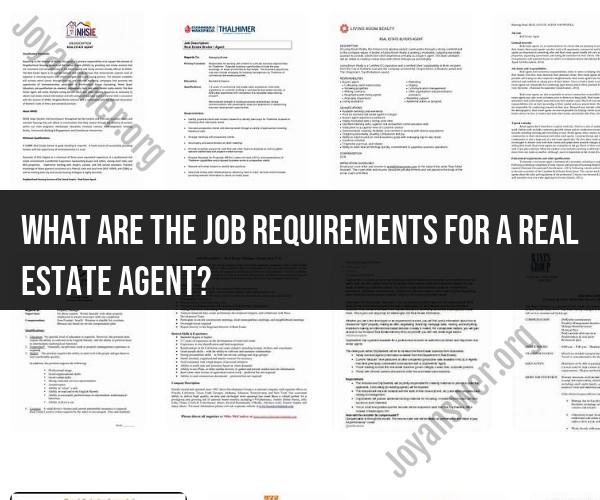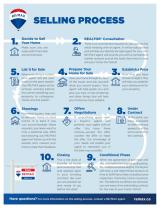What are the job requirements for a real estate agent?
The requirements to become a real estate agent can vary by state and country, but here are the general steps and qualifications to succeed as a real estate agent in the United States:
1. Meet Minimum Age Requirements: Typically, you must be at least 18 or 19 years old to become a real estate agent, depending on your state's regulations.
2. Educational Requirements:
- Pre-Licensing Education: Most states require aspiring agents to complete a state-approved pre-licensing education program. These programs cover essential real estate topics such as contracts, property law, financing, and real estate practices. The number of required hours can vary by state.
3. Pass a Licensing Exam: After completing the pre-licensing education, you must pass a state licensing exam. This exam tests your knowledge of real estate laws and regulations specific to your state.
4. Obtain a Sponsorship (In Some States): Some states require new agents to work under the sponsorship of a licensed real estate broker for a specified period, often referred to as a "mentoring" or "post-licensing" period. During this time, you gain practical experience.
5. Join a Real Estate Brokerage: To practice real estate, you must affiliate with a licensed real estate brokerage. This is where you'll work, gain experience, and receive guidance from experienced brokers and agents.
6. Pay Licensing Fees: You'll need to pay licensing fees, which vary by state, to obtain your real estate license.
7. Pass a Background Check: Many states require a criminal background check as part of the licensing process.
8. Continuing Education: After obtaining your license, you may need to complete ongoing continuing education courses to stay up-to-date with industry changes and maintain your license.
9. Obtain Errors and Omissions (E&O) Insurance: Some states require real estate agents to carry E&O insurance, which provides liability coverage in case of errors or omissions in your work.
10. Join a Realtor Association (Optional): While not required, many real estate agents choose to join the National Association of Realtors (NAR) and their state or local Realtor associations. Being a Realtor comes with additional ethical and professional standards.
11. Build a Client Base: As a real estate agent, you'll need to build relationships with clients, market properties, negotiate deals, and provide excellent customer service to succeed in the industry.
12. Comply with State Regulations: It's crucial to stay informed about your state's real estate laws and regulations, as they can change over time.
Keep in mind that the specific requirements and licensing procedures can vary significantly by state. It's essential to check with your state's real estate commission or regulatory agency for the most up-to-date and accurate information on becoming a licensed real estate agent in your area.
Additionally, real estate agents often need qualities such as strong communication skills, a customer-centric approach, self-discipline, and the ability to adapt to market changes to succeed in the competitive field of real estate.













